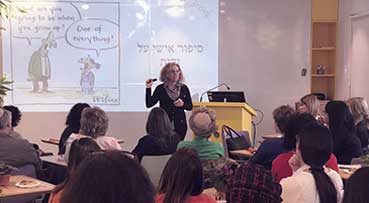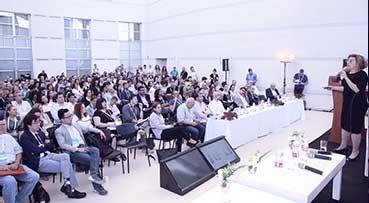Prior generations lived in a physical world, one which expanded over time, but still a physical world. The generations growing up today need to live in both a physical and a digital world at the same time. Live, communicate, work. And they must develop skills to be successful in both.
Around the world a new school year began. The children now entering first grade will join the workforce around 2030. The answers which will be relevant for them then, do not exist today. Neither do the questions. In an interesting conversation with policy makers in the education sector a question was asked about the core capabilities we should be teaching in school these days. This is a very important question, since one of the roles of school is to prepare the future generations in the workplace. And since at work no one asks you to get tested on what your manager taught you that week, why is it that in many of the school systems learning is still about teachers teaching known and accessible content and children taking notes? And why is it that success in school is still defined as children’s ability to study those notes and memorize the content, or in other words, be able to regurgitate what the teacher said? Is this the right education for the future of the workplace?
The Professor of history Yuval Noah Harari, author of the international bestseller From Animals into Gods: A Brief History of Humankind, in an excellent TED talk explains that the difference between us and the rest of the animals on the planet is not at the individual level but in the way we operate in groups. According to Prof Harari, Humans rule the earth because we are the only living creatures who know how to collaborate flexibly and in very large numbers. Flexibly, as indicated by the fact that we’ve managed to reorganize ourselves throughout history. And in large numbers, as seen by our ability to collaborate with many people, whom we do not know. The reason we can do this is that we, out of all the animals on earth, are the only ones who create and believe in Fiction, stories which cause large groups to act on a set of rules, norms and values.
This is the source of the critical place education has in our history. Education is what we use to do what Genetics can’t do – that is to transfer memories, ideas, identity, culture and capabilities. If human beings are unique in that we can process and communicate information between generations, thus creating an intelligence like no other on earth, then the role of education in this process is critical to our being.
In a fascinating column from 2010 in the NY Times, Jaron Lanier asks questions about the role of education in this new day and age. Among these questions, which of the traditional roles of education are replaced, or at least affected by technology, and which are not? According to Jaron, the part where we transfer knowledge and information, that which is known, between generations. This includes the kind of information transferred in schools from teachers to students, the kind that is readily available on the web. Thus, we see students “cut and paste” content from the web onto school work, learning to move content from one place to another in order to achieve a high grade or pass a test.
What is lost in this system, is man’s role in creating. If the students do not learn to think, then no access to information will do any good. So, the future of education in this technological era depends on our abilities to understand what information we need to teach and what can simply stay accessible, as long as we know its there and when and why we would need it. From this it is possible to conclude that at least one of the purposes of education is not about passing on existing information, but about the ability of humans to reinvent ourselves. To direct the new generations towards unknown worlds, where learning is about a leap into that unknown, that place where they can learn to reinvent whole new worlds.
One important aspect of the ability to learn and learn flexibly is what was termed by researchers at Teachers College, Columbia University, and the Center for Creative Leadership Learning Agility:
Learning agility is a mind-set and corresponding collection of practices that allow leaders to continually develop, grow and utilize new strategies that will equip them for the increasingly complex problems they face in their organizations.
This includes the ability to jettison, or drop, skills, perspectives and ideas that are no longer relevant, and learn new ones that are. This kind of learning will teach students to solve the problems of the future, and it is up to current education systems to equip them with these skills, teach them to use different types of learning strategies throughout their lives, so that they can, in the future, deal with the questions that do not yet exist.
Our prior generations lived in a physical world, one which expanded over time, but still a physical world. The generations growing up today need to live in both a physical and a digital world at the same time. Live, communicate, work. And they must develop skills to be successful in both.
The Institute for the Future (IFTF), a California based research group, published a report on the 2020 Future Work Skills. If, a decade ago, workers were worried about work moving to other geographies, mostly to reduce cost (physical world, remember?), today the competition for work is on the Cloud, where thousands of workers to access work beyond the boundaries of time and place (physical and digital…). So if the definition of work is changing, the capabilities enabling us to be productive in the workplace of the future, these are also changing. The report marks ten such capabilities workers will need, most of which are related to what makes us Human, as opposed to machines or algorithms. If machines can do routine work, then humans will do what machines cannot do. Among those, at least in the next decade, are the ability to think, understand, decipher, create, generate unique insights. With access to unprecedented large quantities of data, the workers of the future need to be able to apply abstract thinking, to apply that data to reality and drive decisions.
No less important is the social intelligence, another one of the capabilities that differentiate us from the machine, the ability to understand the Human Being across from us by processing more than just words and pictures. On this subject, researchers in the last few years are trying to understand whether our children are losing the ability to read emotions and human responses as a result of that part of their lives spent in or through the digital world. In this context, “through the digital world” refers to the tools we use, which “screen out” many of the “sensors” available in a face-to-face conversation, in the physical world. And so the questions are asked whether our children are losing the ability to read those sensors. And by “living in the digital world” we refer not only to games, but even to Facebook, which is in essence a digitization of ourselves…
A UCLA study suggests we have reason to be concerned. The social skills of children are declining with less face-to-face time, as a result of digital media. And the more concerning part is the decline in their sensitivity to emotional cues, the ability to read the emotions of others. Social interaction, without the aid of technology, is critical in teaching children to read, understand and respond to emotions of those around them. And thus we return to the human factor in education: the role of the teacher, the human being.
If you were lucky enough to have had that kind of teacher, whom you remember to this day, you probably don’t remember the details of the knowledge they taught you for a grade. You probably do remember them in the context of the human connection, the way you were treated, the life lessons you learned. Ultimately, at the heart of any successful education system is the human being. They do not teach for a test, certainly not for a grade. They teach our children to be curious about what they see, think independently, ask questions about the world around them, use the endless information space out there to be creative, across disciplines and in collaboration with others, near or far. And so, at the start of a new school year we should wish all the students around the world, that we retain that human essence, the heart of what makes us human.

![large-AX1A2125-2[1] large-AX1A2125-2[1]](https://dev.niritcohen.com/wp-content/uploads/elementor/thumbs/large-AX1A2125-21-pnzedcs72atx5aeurqytqdiihxixlq02re9mlz805s.jpg)






